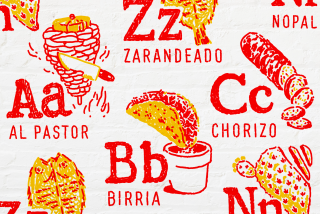Farm Moors
- Share via
There are a lot of Arabic food words in Spanish. That’s no surprise; the Moors ruled most of Spain for 400 years and hung on to smaller pieces for another 400 after that. The surprise is how many of these words refer to things that were already known in Spain when the Moors came.
For instance, olive oil was being made there during Roman times, but the Spanish word for oil, aceite, comes from the Arabic al-zait. Likewise the words for Swiss chard (acelga, from al-silq), sesame (ajonjoli, from al-juljulan) and broad beans (alubia, from al-lubiya). Even the words for duck and mussels come from Arabic (pato from batta, almeja from al-midya).
Here’s the reason. When a country is under foreign rule, the foreigners typically live in the cities and enjoy the fruits of their subjects’ labors. But the Arabs, coming from desert lands, found Spain incredibly lush--it’s the only country where Arab poets regularly wrote nature poetry--and they eagerly settled in the countryside, where they introduced water-saving Middle Eastern irrigation techniques that made Spain an agricultural powerhouse for centuries. (That ended after the Reconquest, when the Spanish monarchs cut a deal with the powerful shepherds’ guild to turn a lot of Spain into pasture.)
Anyway, the Arab element was so strong in food production that Spanish ended up borrowing some words it could as easily have inherited straight from Latin. For instance, albaricoque (apricot) comes by way of Arabic from Latin praecoquum and alcaparra (caper) from Latin capparis. Oddest of all, the Arabs, not the world’s most famous fishermen, managed to recycle the Latin word for tuna (thunnus) into Spanish by way of their own language: atun (al-tunn).
More to Read
Eat your way across L.A.
Get our weekly Tasting Notes newsletter for reviews, news and more.
You may occasionally receive promotional content from the Los Angeles Times.








